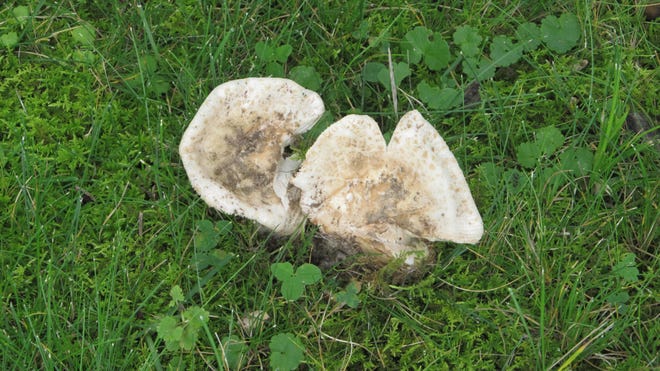
Recent rains have mushrooms and other fungi of all types popping up on lawns throughout Central Texas.
Some of those weird fungi could be toxic to dogs, and it’s hard to know which ones are harmless, which ones will cause an upset stomach and which ones could cause damage to the liver, kidney or brain — or even death.
“You almost have to be a mushroom expert,” Firehouse Animal Health Centers veterinarian Hunter Bowen said. “One mushroom, a Chihuahua could eat 10 pounds of. Another mushroom, a Great Dane could eat one tiny one, and it would be lethal.”
What should you do if your dog ate a mushroom?
If your dog eats a mushroom, see if you can collect a sample of it, and put it in a plastic bag with a dry paper towel to protect it. Call your veterinarian to explain what happened and say you are on the way with your dog.
If you think the dog ate a mushroom but can’t get a sample, still call the vet. If it is after hours, there are emergency vet clinics, and Firehouse has a 24-hour triage line. You’ll be directed there by calling one of its locations.
Some mushrooms are so toxic that vets want to start inducing vomiting safely and use other treatments to absorb the toxins within an hour of the dog eating it.
More water than normal:Floodgates open to distribute runoff water into Lake Travis from Lake LBJ, Llano River
What else is bad for dogs to eat?
If you are concerned about anything your dog has eaten, you also can call the American Society for the Prevention of Cruelty to Animals’ Animal Poison Control Center at 888-426-4435. That’s actually what most vets will do if they are not sure which type of mushroom or other possibly toxic material a dog ate.
Recreational mushrooms and marijuana also cause many dogs to have a really bad night, with a call or visit to the vet needed, depending on their symptoms.
Other edibles that cause problems include grapes, raisins, chocolate, garlic and onions. Those should all be avoided. The poison control number or your vet can help with those.
Cats also like to eat bad things
Cats tend to eat more human-made objects, such as plastic and string, rather than mushrooms. They do like to eat plants such as lilies that are toxic to them.
“Cats seem to love them, but they shouldn’t,” Bowen said.

Watch out for the icky water and dogs
Right now, with creeks, streams and even lakes full of new rainwater, your dog might want to go for a swim or a splash. Dogs don’t have any concept of whether the water is sanitary. They will continue drinking it even if it looks terrible or smells bad.
Bring drinking water for your dogs and offer it to them instead of relying on creek water as their hydration source.
Larger bodies of water generally will be safer than small streams and creeks, but in recently years our lakes have been deadly to dogs. Blue-green algae has been found in the Highland Lakes, including Lake Travis, Lake Austin and Lady Bird Lake. Earlier in July, a dog died after swimming in Lake Travis.
Keep an eye on such sources as the Lower Colorado River Authority and city and county websites for water quality alerts before you take your dog swimming.
Taking your dog to a Texas beach is usually OK. Dogs typically won’t drink the saltwater.
Learn more:Pet owners urged to avoid algae in Lake Travis as dog dies after swim at Point Venture
Watch out for the heat and dogs
Mushrooms and icky water are some of the dangers outside to dogs, but the biggest one is the heat, Bowen said.
“Every summer, there are people new to Texas, and they and their dogs are unprepared” for how hot it gets, he said.
This week temperatures will go back into the upper 90s after a week of rain.
Dogs suffer heat stroke and such injuries as blistered paw pads. Avoid keeping your dog outside for an extended time during the heat of the day until fall.
Have a way for dogs to cool off after going for a hike or playing outside, and bring plenty of clean water with you to keep dogs and humans hydrated.
This post was originally published on this site be sure to check out more of their content.












































